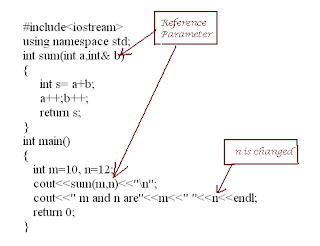Bitwise operators
C is a small language. It has just 32 keywords. But it has a rich set of operators.
The operators which are commonly not used are bitwise operators. Here C comes closer to Assembly language because it lets you manipulate individual bits of a number.
Let us look at some examples.
int a,b,c;
a = 10;
b = 12;
c = a|b;
Here | is bitwise OR operator. Individual bits of a and b are ORed and result is stored in c.
a = 00001010
b = 00001100
c = 00001110
So c will be 14
A small summary of bitwise operators here
e.g.
a = 10;
b = a<<2;
a = 00001010;
b = 00101000;
So b will be 40.
>> shifts all bits of the number to right by given number of bits. The bits pushed beyond LSB are lost.
a = 10;
b = a>>2;
000010101 >> 2 = 00000010
b becomes 2.
As you might have guessed, left shift operator multiplies the number by 2 to the power of n
Right shift divides the number by 2 to the power of n.
|=, &= and other operators
And arithmetic assignment operator, there are bitwise assignment operators.
|= &= ^= <<= >>=
a |=b ;
is equivalent to a = a|b;
Now time for some small program.
The operators which are commonly not used are bitwise operators. Here C comes closer to Assembly language because it lets you manipulate individual bits of a number.
Let us look at some examples.
int a,b,c;
a = 10;
b = 12;
c = a|b;
Here | is bitwise OR operator. Individual bits of a and b are ORed and result is stored in c.
a = 00001010
b = 00001100
c = 00001110
So c will be 14
A small summary of bitwise operators here
| Operator | Description | Example |
|---|---|---|
| & | AND - If both bits are 1, result is 1. If not result is 0 | 10&4 is 1010 | 0100 = 0000 |
| | | OR- If either bit is 1, result is 1. If not result is 0 | 10|4 is 1010 |0100 = 1110 = 14 |
| ^ | EXOR - If either bits are 1, but not both, result is 1. If not result is 0 | 10^4 is 1010 ^ 0100 = 1110 10^8 is 1010 ^1000 = 0010 = 2 |
| << | LEFT SHIFT - Shifts bits by n places to the left, adding 0 in empty bits | 10<<2 101000="40</td" 1010=""> |
| >> | RIGHT SHIFT - Shifts bits by n places to the right adding 0 in empty bits | 10<<2 101000="40" 1010="" are="" beyond="" bits="" lost="" lsb="" shifted="" td=""> |
| >> | COMPLEMENT Complements all the bits. i.e. 1 to 0 and 0 to 1 | ~10 is 11110101 for unsigned char (1 byte) |
Shift Operators
Left shift - <<, shifts all bits of a number to left by given number of bits. The empty bits in LSB are filled with 0.e.g.
a = 10;
b = a<<2;
a = 00001010;
b = 00101000;
So b will be 40.
>> shifts all bits of the number to right by given number of bits. The bits pushed beyond LSB are lost.
a = 10;
b = a>>2;
000010101 >> 2 = 00000010
b becomes 2.
As you might have guessed, left shift operator multiplies the number by 2 to the power of n
Right shift divides the number by 2 to the power of n.
|=, &= and other operators
And arithmetic assignment operator, there are bitwise assignment operators.
|= &= ^= <<= >>=
a |=b ;
is equivalent to a = a|b;
Now time for some small program.
#include<stdio.h>
int main()
{
int a =10;
int b = 1;
int c;
c = a|b;
printf("OR %d\n",c);
c = a&b;
printf("AND %d\n",c);
c = a^b;
printf("EXOR %d\n",c);
c = a<<b;
printf("Left shift %d\n",c);
a >>=b;
printf("right shift= %d\n",a);
c = ~b;
printf("complement of b%d\n",c);
}


Comments
Post a Comment